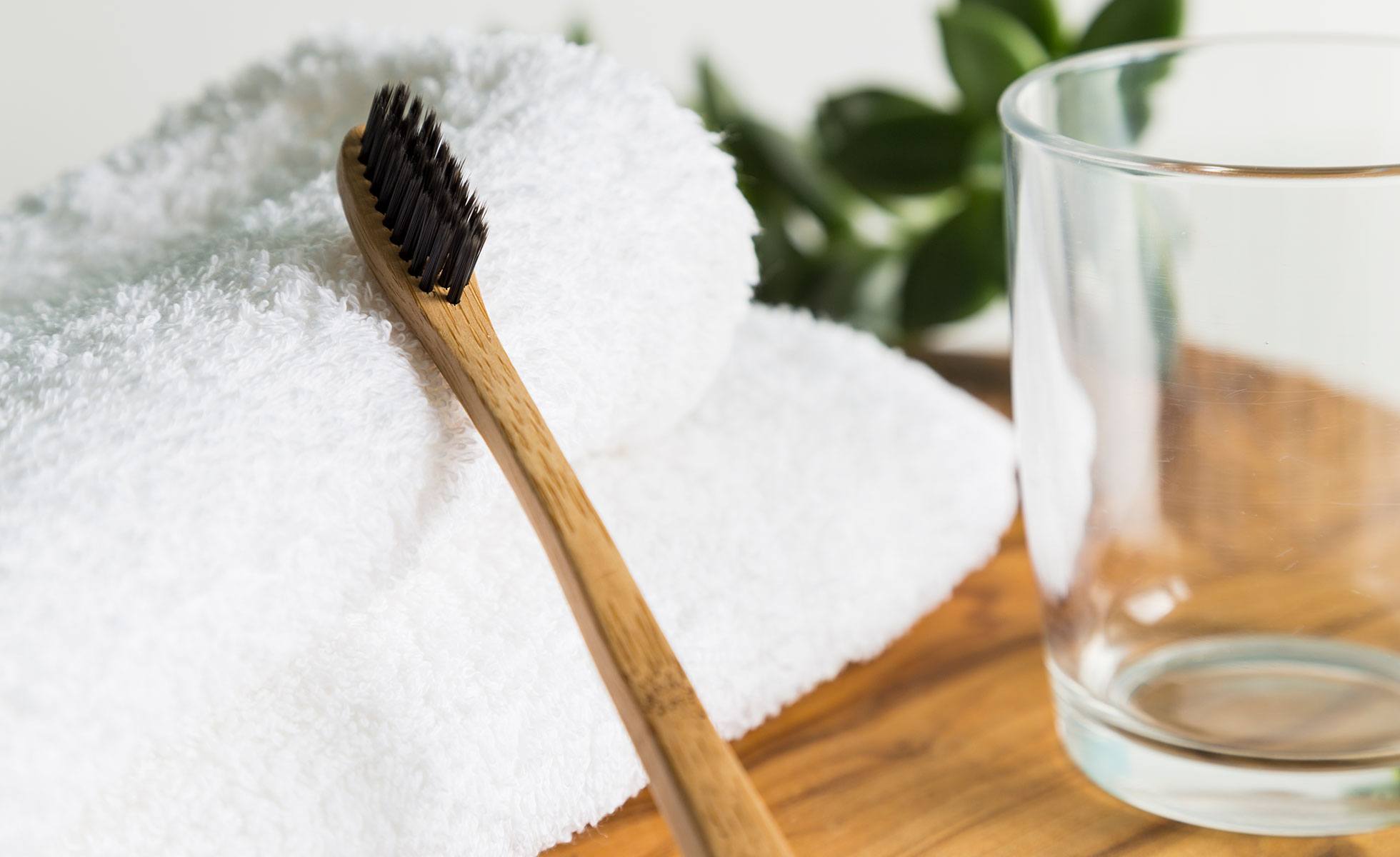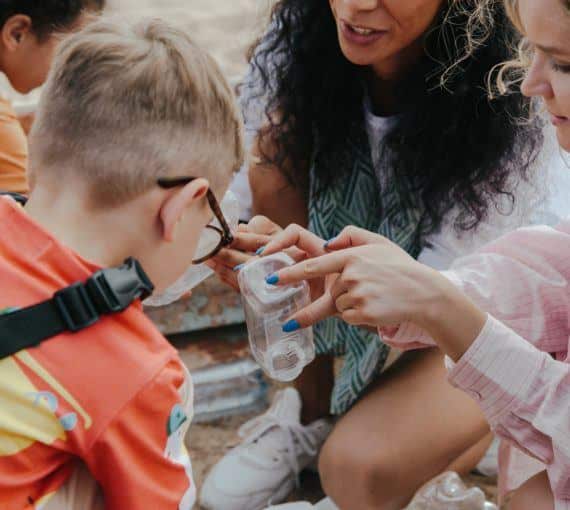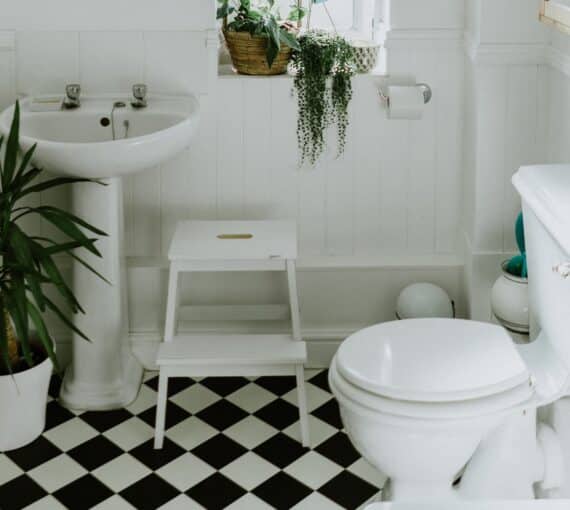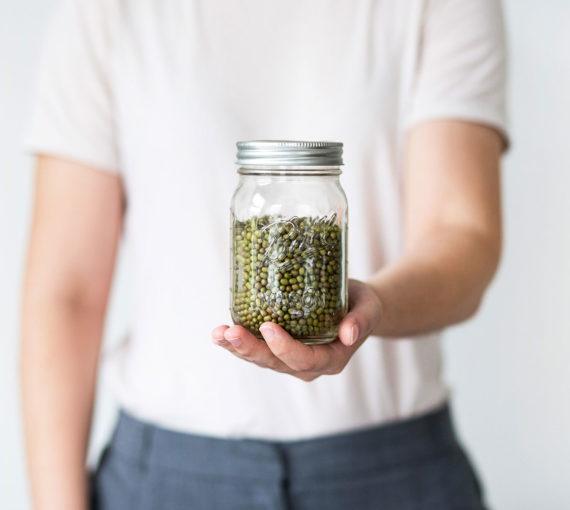
Did you know that about one billion toothpaste tubes and one billion plastic toothbrushes end up in landfills every year? Dental care is essential to human health. It also influences and is influenced by the planet’s health. Let’s maximize our dental care and minimize our impact on the planet.
Eco-friendly toothpaste, toothbrushes and floss
DIY toothpaste
Making your own toothpaste is easier than you think and there are many recipes out there.* As well as experiencing the joy of creating a homemade product, you’ll:
- Avoid plastic microbeads which may contain toxic substances such as phthalates and BPA that can leach into water AND get consumed. (Microbeads are banned in Canada but the wastewater cycle knows no borders! If you’re living elsewhere, check ingredient lists for PE or PP, PET, PMMA or nylon. For disposal, consider returning it to the store or mail it back to the manufacturer.)
- Avoid triclosan (an anti-bacterial agent) which may interfere with hormone function, contribute to antibiotic-resistant bacteria AND harm fish and other wildlife.
- Avoid sodium laureth sulfate (SLS or SLES), which makes the bubbles in many store-bought toothpastes but also can be contaminated with 1,4-dioxane, which may cause cancer.
- Save money — making your own is cheaper than buying.
*The information provided in this article is not a substitute for professional dental advice. Exercise caution when making and using DIY toothpaste. Homemade toothpaste, like all DIY products, can have risks such as improper balance of ingredients, lack of fluoride and bacterial contamination. It’s important to do your own research and follow a reliable recipe. Consult with your dentist before using homemade toothpaste to ensure it’s safe and effective for your specific dental needs.
The Canadian Dental Association recommends that toothpaste should contain fluoride to help prevent tooth decay and strengthen tooth enamel. Baking soda (a frequent ingredient in DIY toothpaste) can be abrasive and lead to damaged tooth enamel, so use with caution and consult with your dentist if unsure.
Zero-waste toothpaste
If you’re not a fan of the taste of DIY toothpaste, try these other zero-waste options!
- Bulk paste and powder toothpaste found in most refill and bulk shopping stores.
- Toothpaste tablets (e.g., Change Toothpaste). Simply crush and brush.
- Tooth powder (e.g., Life Unpacked). Your first purchase comes in a reusable glass jar and refills are in plastic-free packaging.
Eco-friendly toothbrushes
The total number of plastic toothbrushes being produced, used and thrown away each year has grown steadily since the first one was made in the 1930s.
The best plastic toothbrush alternatives:
- Bamboo is the most popular and accessible. Remove the bristles when they’re done and put the handle in your compost bin. (Bonus: bamboo has antibacterial, anti-fungal and antimicrobial properties.)
- Look for non-GMO cornstarch toothbrushes made from 100 per cent biodegradable, sustainably grown corn. Follow the same end-of-life instructions as bamboo toothbrushes for composting.
- Plastic takes hundreds of years to break down naturally. Recycled plastic toothbrushes reduce landfill waste. When yours is ready to retire, check your municipal recycling program or use TerraCycle.
Find creative uses for spent toothbrushes — cleaning, arts and crafts, stain removal and polishing.
Zero-waste dental floss
While dental floss may not have the same bad reputation as plastic toothbrushes, it still has an environmental impact. Most commercial floss is made from waxed nylon, which is non-recyclable, non-biodegradable and packaged in plastic. The rising popularity of plastic dental picks are contributing to plastic waste in landfills.
The best dental floss alternatives:
- Many retailers and zero-waste shops sell biodegradable floss made of plant-based materials (such as corn) waxed in candelilla for strength and ease of use.
- Mulberry silk floss has a low carbon footprint, but is not vegan.
- Cocofloss makes theirs out of 85 per cent recycled polyester spun from water bottles, waxed in coconut oil.
- Water flossers use a pulsating stream to remove plaque and food debris between teeth and gums.
- Some zero-waste stores offer refillable floss picks.
Recycle your plastic dental products
Recycle your toothbrushes, flossers, toothpaste tubes and caps, plastic packaging and mouthwash bottles and caps via TerraCycle’s oral care free recycling program. Create an account, print a free shipping label and ship it off. Once collected, products and packaging are cleaned and separated by material type. The materials are then recycled into raw formats that manufactures can use to make new products.
And remember… never flush floss!



